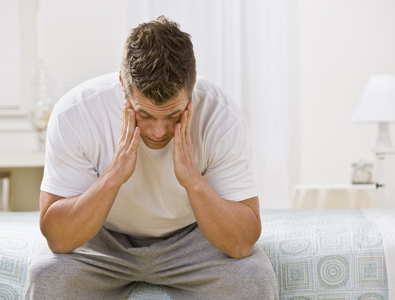The Truth About Men Who PMS
By:
Irritability? Mood swings? A recurring cycle? Sound familiar, fellas?
 Flickr/Mic445 - flickr.com
Flickr/Mic445 - flickr.com
According to at least one recent study, those symptoms — and more — were common for more than a quarter of British men who said they experience a "man period."
The study, conducted by the financial site Vouchercloud, found that of the 26 percent of men who said they experienced side effects associated with premenstrual syndrome in women (PMS), 56 percent said they experienced irritability, 51 percent experienced fatigue, 47 percent said they had increased cravings, and 43 percent said they were easily upset.
Five percent said they experienced "menstrual cramps."
While some symptoms were probably imagined (menstrual cramps), researchers say that the "male period," or Irritable Male Syndrome (IMS), may actually be pretty common. (Irritable Male Syndrome, as a term, was coined in 2001 by Dr. Gerald Lincoln of Scotland, who was studying the "seasonal rise and decline in testosterone levels in Soay sheep," the Huffington Post reported.)
"Men, like women, have hormonal changes that go on throughout their lives," said Jed Diamond, an independent researcher and author of "The Irritable Male Syndrome." "I think everyone understands that."
The short answer to the "do men have periods?" question is no: men don't have the anatomical makeup that makes women ovulate once a month. But Diamond told ATTN: that the symptoms women experience during their menstrual cycles are not necessarily gender specific.
"We know, for instance, that testosterone fluctuates at least four times an hour," Diamond says, explaining that IMS symptoms — including irritability, tiredness, depression, libido swings, according to Diamond's Men Alive website — are largely tied to hormonal changes.
"When you're up you feel a certain way, when you're down you feel a different way," he said. "We know that there are monthly cycles in men in the same way that there are in women but they're different than women's, because they're obviously not tied to ovulating."
The regularity of IMS, which has also been observed in animals, varies according to hormonal changes, which means that the range could be as broad as hourly to monthly. Those fluctuations are likely to change with age, too, as hormone levels tend to slump as we get older.
Diamond isn't alone in the theory, either. Writing in the Huffington Post, Dr. Gregory Jantz, a mental health researcher, noted:
"In men, after age 30, as far as testosterone levels go, it’s all downhill. Because of this drop Dr. Lincoln’s Irritable Male Syndrome (IMS) has been used when talking about the behavior of middle-aged men, with the attitudes and actions found in male mid-life crises."
The biggest takeaway, according to Diamond and others , is a semantic one — recognizing that hormonal changes can affect both sexes, even though they may not be tied to ovulating.
"When you recognize it as hormonal rather than the creation of an egg and delivery of an egg, men have their own hormonal cycles," he said.
